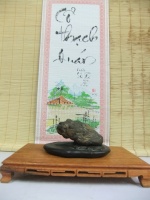island lake landscape
5 posters
Page 1 of 1
 island lake landscape
island lake landscape
IBC provides the forum
hello chris, I'm not fluent in English, he will help edit my post, thanks
Hi, I sent pictures of rocks, islands, and we look forward to receiving your comments, thanks

hello chris, I'm not fluent in English, he will help edit my post, thanks
Hi, I sent pictures of rocks, islands, and we look forward to receiving your comments, thanks


nguyển thái lý- Member
 stone only
stone only
Milk and toys are for kids, lose them, stone alone has power! "Scenic Landscape" as I C... 
good color, great shape, smooth skin, real nice...
if possible reduce daiza by 50% too thick for scale

good color, great shape, smooth skin, real nice...
if possible reduce daiza by 50% too thick for scale
stonener- Member
 Re: island lake landscape
Re: island lake landscape
Hi Nguyen Thai Ly... Hi Stonener... It is hard for me to not assess this stone as suiseki, but it is not suiseki. Regarding its best features & possible improvement, my advice would follow landscape-view suiseki appreciation. We should be careful to not confuse Vietnamese stone appreciation, which has common features, with Japanese-style suiseki practice.
Similar to suiseki, distant & gentle peaks to one side & behind a high mountain lake are exceptionally evocative. A long slope to the right & forward is broken by a considerable protrusion that draws attention. Is it necessary to rationalize it as a landscape feature? That probably depends upon the viewer. It is okay for me as an ambiguous feature-- if smaller, it could suggest a remote hut in the landscape, which is a commonly encountered allusion in suiseki.
I agree with Stonener re' the white lake (milk) as a distraction from natural feeling. We do not experience lakes as white & the simple depression says "more with less." On the other hand, I've seen Mr. Murata (Japan Aiseki Kai) publish similar "white pools" on dark stones to highlight the pooling, and Willi Benz has promoted this technique. Adding liquid to the pool of a stone in a daiza has been discouraged by Nippon Suiseki Association as lacking consideration for the daiza. Is this a suiseki in a daiza?
The use of figurines reduces the size of the scene to conform to the dimension of the accessories. One appears to be a pagoda & the other appears to be an animal, and they project very different sizes of the scene. Placing a pagoda on the top of the tallest mountain peak squashes the height of the scene-- it is almost always a poor placement for suiseki, but we see it often among Vietnamese collectors. Perhaps, pagodas are placed on the apex of mountain peaks in Vietnam. The animal figure is VERY LARGE unless the viewer imagines the scene as a small pond on a rising hill. No figurine allows the imagination to wander most, which would be the best choice for suiseki appreciation.
The seat is larger than necessary but commonly seen with Vietnamese stones. The outer wall of the seat changes contour (more blunt on the right side than on the left side). There could be a good reason but it is not obvious; changing contour draws the eye to the seat instead of the stone.
More that the seating, I am distracted by the wetted surface of the stone and its dark stains. Stains can often be dissipated by gentle weathering. An artificially wet, water-repelling surface is terribly distracting for suiseki appreciation, but it is acceptable for viewing that is not suiseki in style.
Similar to suiseki, distant & gentle peaks to one side & behind a high mountain lake are exceptionally evocative. A long slope to the right & forward is broken by a considerable protrusion that draws attention. Is it necessary to rationalize it as a landscape feature? That probably depends upon the viewer. It is okay for me as an ambiguous feature-- if smaller, it could suggest a remote hut in the landscape, which is a commonly encountered allusion in suiseki.
I agree with Stonener re' the white lake (milk) as a distraction from natural feeling. We do not experience lakes as white & the simple depression says "more with less." On the other hand, I've seen Mr. Murata (Japan Aiseki Kai) publish similar "white pools" on dark stones to highlight the pooling, and Willi Benz has promoted this technique. Adding liquid to the pool of a stone in a daiza has been discouraged by Nippon Suiseki Association as lacking consideration for the daiza. Is this a suiseki in a daiza?
The use of figurines reduces the size of the scene to conform to the dimension of the accessories. One appears to be a pagoda & the other appears to be an animal, and they project very different sizes of the scene. Placing a pagoda on the top of the tallest mountain peak squashes the height of the scene-- it is almost always a poor placement for suiseki, but we see it often among Vietnamese collectors. Perhaps, pagodas are placed on the apex of mountain peaks in Vietnam. The animal figure is VERY LARGE unless the viewer imagines the scene as a small pond on a rising hill. No figurine allows the imagination to wander most, which would be the best choice for suiseki appreciation.
The seat is larger than necessary but commonly seen with Vietnamese stones. The outer wall of the seat changes contour (more blunt on the right side than on the left side). There could be a good reason but it is not obvious; changing contour draws the eye to the seat instead of the stone.
More that the seating, I am distracted by the wetted surface of the stone and its dark stains. Stains can often be dissipated by gentle weathering. An artificially wet, water-repelling surface is terribly distracting for suiseki appreciation, but it is acceptable for viewing that is not suiseki in style.

Chris Cochrane- Member
 Re: island lake landscape
Re: island lake landscape
hello chris
I do not understand why it was not for suiseki, I know, suiseki eroded by water and its weight not exceeding 30kg, this is the lesson I learned in VIETNAM, as well as in your country to suiseki do not do well so he could let me know, and he sent the attached illustrations for me, thank you
I do not understand why it was not for suiseki, I know, suiseki eroded by water and its weight not exceeding 30kg, this is the lesson I learned in VIETNAM, as well as in your country to suiseki do not do well so he could let me know, and he sent the attached illustrations for me, thank you

nguyển thái lý- Member
 Re: island lake landscape
Re: island lake landscape
I'm also knew at this, and love to learn. Why is Yu.... 's stone not classified as suiseki. I agree with the added figurines, it distorts the scale.
What are the rules for suiseki, who gets to decide?
What are the rules for suiseki, who gets to decide?

Andre Beaurain- Member
 Re: island lake landscape
Re: island lake landscape
Hello.
China Korea Japan Amerika and so on have their own classifications of viewing stones.
They have different classification terms and criteria and therefore different guidelines.
As example in
Japan they use for viewing stones names like: suiseki and aiseki
Korea: suseok
China: gongshi, shangshi, shangseh, ya sek.
Phillipines, Indonesia and Vietnam will have different names to i gather?
Because the eye (the character-tradition) of Japanese or Vietnamese people are different,
appreciation of a stone will be different.
One sees different things and wants different things in the quality of a stone and stone setting.
Best is to appreciate a stone in your own eye's world, but this does not mean there is no universal appreciation possible,
one only has to acknowledge these differences i feel.
Also i can imagine as foreigner one wants to learn about Japanese appreciation and collect stones that way because it is very appealing, but one should go into the soul of the Japanese to understand and do not forget one has his own identity to accept and appreciate to.
Very interesting to think about a question like Nguyen Tha Ly is asking about his lovely mountain stone.
Regards, Sunip
China Korea Japan Amerika and so on have their own classifications of viewing stones.
They have different classification terms and criteria and therefore different guidelines.
As example in
Japan they use for viewing stones names like: suiseki and aiseki
Korea: suseok
China: gongshi, shangshi, shangseh, ya sek.
Phillipines, Indonesia and Vietnam will have different names to i gather?
Because the eye (the character-tradition) of Japanese or Vietnamese people are different,
appreciation of a stone will be different.
One sees different things and wants different things in the quality of a stone and stone setting.
Best is to appreciate a stone in your own eye's world, but this does not mean there is no universal appreciation possible,
one only has to acknowledge these differences i feel.
Also i can imagine as foreigner one wants to learn about Japanese appreciation and collect stones that way because it is very appealing, but one should go into the soul of the Japanese to understand and do not forget one has his own identity to accept and appreciate to.
Very interesting to think about a question like Nguyen Tha Ly is asking about his lovely mountain stone.
Regards, Sunip
sunip- Member
 Similar topics
Similar topics» My new LANDSCAPE STONE ... ( the lake )
» ISLAND - Landscape .
» Natural lake , landscape - stone describes ...
» ........ The Lake .......
» new suiseki
» ISLAND - Landscape .
» Natural lake , landscape - stone describes ...
» ........ The Lake .......
» new suiseki
Page 1 of 1
Permissions in this forum:
You cannot reply to topics in this forum|
|
|







